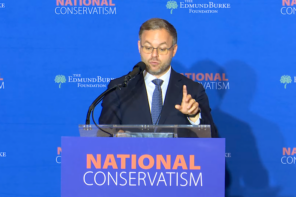It is easy to say that the “religious right” opposes the “secular left,” but what about the simple fact that many on the right are not religious, and many on the left are? The right-left division is ultimately reductionist—religion infuses discussions surrounding this divide, and is reduced in kind.
Philosopher Karin Fry’s new book, Beyond Religious Right and Secular Left Rhetoric: The Road to Compromise explores the positions commonly advocated by culture war adversaries, searching for opportunities for reconciliation.
RD’s Eric C. Miller spoke with Fry about her project.
Much of your work has focused on philosophers like Arendt, Lyotard, and Kant, but recently you’ve been studying contemporary culture war debates. What inspired that interest?
In some ways, I just fell into it. I was asked to do something about religion for an on-campus event and the reaction was so positive, it inspired me to continue. However, I have increasingly become interested in political discourse, since students are overwhelmed by it. In my teaching, I found that students would mimic whatever pundits were currently saying about a topic, without really thinking about it.
Hannah Arendt in particular is a thinker who recognized the danger of this, and even though she does not discuss religious topics at any length, my book fits nicely with some of her views. She believed in legitimate differences of opinion in politics and the importance of maintaining venues for discussion and disagreement. In my classes, I think it is very important to give students resources for negotiating the flow of information to help them think for themselves.
It does seem that much of our political discourse has been reduced to an exchange of overheard talking points. I wonder if you could speak to the danger this poses, and how Arendt has influenced your approach. Are there any particular issues or debates that you find especially troubling?
I think what is most troubling is the massive amount of false information that is distributed by political operatives and marketers that is accepted as true.
Sometimes it takes a great deal of effort to research an issue and find out the complexities about it. With a sound bite culture, the facts become obscured and people make decisions based upon falsehoods and superficial understandings of an issue.
Often, people think that if they find out the facts a clear-cut answer will emerge, but more often than not, further examination shows the legitimacy of more than one position on the issue. Arendt worried about people talking in stock phrases and clichés rather than trying to think through an issue. The road to totalitarianism relies on lack of discussion and operatives who will accept the party line, rather than question it.
Walter Lippmann once argued that the public could not be expected to follow political debates because people don’t have time to study them in all their complexities. These days, categories like “religious right” and “secular left” serve as shortcuts. It’s easy to align yourself with people like yourself – and against their declared adversaries. What could go wrong?
It’s totally understandable why people would want shortcuts and why they are necessary to a degree. What goes wrong is that politics becomes a set of monologues filled with negative perceptions of the opposition, rather than actually engaging in dialogue to find solutions and compromises. My book shows that those aligned with “religious right” and “secular left” don’t correctly understand each other’s agendas and can sling mud, but cannot move beyond that. I fear that this is the case with many other politically charged debates in America. Therefore, we get stuck in rumor, innuendo, and playground insults rather than seeking out areas of commonality.
Do you think the movement leaders and advocacy groups that drive this dichotomy are interested in compromise?
For many of them, most likely, they are not interested in solving conflicts. According to their rhetoric, they seek to annihilate the opponent and “win” the debate. They seek to whip up support from those who already agree with them and generate more campaign funds.
Yet “winning” is not possible in the way they imagine, as differences of opinion will always exist.
Some writers do seek some middle ground, such as Steven Waldman’s Founding Faith, David Hollenbachs’ The Common Good and Christian Ethics, and even to some degree, Richard Land’s The Divided States of America? Surprisingly, Barack Obama’s treatment of the issues in Audacity of Hope are very well informed. Yet, his knowledge has not translated into an ability to actually get the kind of compromises he is after—perhaps because there are so many other interests pushing for staunch opposition rather than compromise.
In your view, what model could replace the left-right binary?
That’s a tough question. One problem is that the amount of money in politics encourages perpetual campaigning and fundraising. Amy Gutmann and Dennis Thompson’s book The Spirit of Compromise: Why Governing Demands It and Campaigning Undermines It has done a good job explaining how the endless campaign discourages making a deal between opponents. The need to raise funds for the next campaign causes candidates to be uncompromising. If candidates were given the same amount of money for campaigning, it would change the dynamic because the need to raise funds would be off the table. It would also give us more “full time” politicians, rather than fundraisers.
At the local level, persons who disagree need to get together and see each other as rational human beings. The First Amendment Center tries to settle local disputes through mediating discussions between people who radically disagree and they have made nice progress on local disputes.
Anecdotally, I know of a Mississippi minister who has introduced his flock to atheists, not to convert them, but to begin to see them as people. More efforts like this would be helpful in transforming perceived “enemies” into persons with valid differences of opinion. High quality journalism can also play a part in making discussion more nuanced and educating the public. Instead of being discouraged and turned off from politics, the public needs to reject the binary and demand more. Since it is so much easier to just hate the opponent in an uncomplicated way, and that makes money for many in political media, it is difficult to see how a substantial change could occur without a public demand for it.
The trick is getting the public to see the value of a more nuanced and accurate approach.
On a final note—assuming that most RD readers are already skeptical of left-right politics—what would you say is the most important takeaway from this research?
First, the religious right and secular left aren’t as opposed as they think. For example, most religious right literature still maintains a belief in the importance of a separation between church and state. Moreover, there are areas of moral agreement between the religious right and secular left, even though the reasons for why an act is considered to be immoral are different.
Second, most are blind to these similarities because they do not familiarize themselves with their opponents’ claims. Most left-leaning literature characterizes Christian conservatives as seeking full-on theocracy, while right leaning literature sees the left as moral relativists.
Third, this means that much of the popular political debate on these topics is a ruse and merely perpetuating a straw man fallacy. This has a damaging effect on politics, since much of the discussion is way off track.
Finally, the hope that there are areas of commonality for the majority of those in disagreement with each other is not necessarily good news for those of minority religions—since their religions have difficulty fitting into the Protestant framework that is so common in the United States. Even secular atheists understand religion in very Protestant-like way, involving a stress upon individual decision-making about doctrines of belief. These are principles that atheists believe in, even when they reject religiosity. Religions that don’t fit into this mold cannot truly have freedom of religion in this country until the courts understand religion differently. Otherwise, there is no fairness in the application of principles that are skewed from the beginning to benefit particular types of religion over others.




